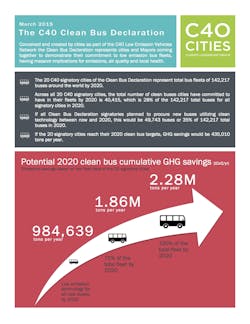On March 27, Latin American mayors convened in Buenos Aires at the C40 Latin American Mayors Forum to demonstrate bold leadership in the global fight against climate change. Buenos Aires Mayor Mauricio Macri, Mexico City Mayor Miguel Ángel Mancera and former President of México and Chair of the Global Commission on the Economy Felipe Calderón joined C40 Chair and Rio de Janeiro Mayor Eduardo Paes in announcing both the C40 City Clean Bus Declaration of Intent and a Latin American Cities Declaration on the Compact of Mayors, which is the world’s largest cooperative effort among mayors to fight global climate change and its effects.
“By taking these decisive steps here today, Latin American cities are leading the way in driving urban action that reduces greenhouse gas emissions and climate risks, while increasing the health, wellbeing and economic opportunities of urban citizens,” said C40 Chair and Rio de Janeiro Mayor Eduardo Paes. “Mayors, through networks such as the C40, are learning from each other, exchanging ideas and thereby accelerating local action on the ground. Today's event is testament to this promising trend.”
Latin American cities have enormous potential to reduce global greenhouse gas emissions – C40 research indicates that taken together they could cut emissions by 2,500 MtCO2 by 2030, or the equivalent of taking 526 million cars off the road.
Latin American Cities Declaration on the Compact of Mayors
In the first such regional commitment of its kind, 20 Latin American cities – including 9 C40 cities – signed a Declaration on the Compact of Mayors, which is the world’s largest cooperative effort among city leaders to reduce greenhouse gas emissions, track progress and prepare for the impacts of climate change. The Compact organising partners – including C40 Cities Climate Leadership Group, ICLEI Local Governments for Sustainability and United Cities and Local Governments – are encouraging the world’s cities to commit to the Compact of Mayors before the UN climate talks in Paris in December, and congratulate Latin American cities for demonstrating leadership and commitment to the effort.
The full list of signatories includes:
- C40 Cities: Bogotá, Buenos Aires, Caracas, Curitiba, Lima, Mexico City, Quito, Rio de Janeiro, São Paulo
- Non-C40 Cities: Asunción, Belo Horizonte, Cali, Cordoba, Fortaleza, La Paz, Panama, Santiago, Santo Domingo, Tegucigalpa, Valparaíso
“This Forum comes at a critical moment in Latin America’s urban development,” said Buenos Aires Mayor Mauricio Macri, who hosted the Forum event. “Mayors here are recognizing that they can play a key role throughout the region and internationally, but we must continue to set aggressive climate targets and pursue our goals. If we work together, Latin American cities stand to contribute enormously to the global climate fight while improving the lives of our citizens.”
The Compact of Mayors is designed to recognise and encourage city-level climate action while capturing efforts through a consistent, transparent public emissions reporting process. Committing to the Compact requires establishing a GHG inventory using the new GPC gold standard for calculating city-scale emissions, then using that assessment to help prepare for the effects of climate change. This includes identifying city-specific hazards and vulnerabilities and creating a climate action plan that includes adaptation or emissions reduction targets.
“Cities across Latin America are doing smart work to make people’s lives better while also shrinking carbon footprints, in many cases by finding new ways to expand mass transit,” said UN Special Envoy for Cities and Climate Change and C40 Board President Michael R. Bloomberg. “Making a commitment to the Compact of Mayors is another important step forward for Latin American cities, because it will help them set clear climate goals, measure their progress, and share best practices with the rest of the world. With the U.N.’s Climate Change Conference in Paris just around the corner, cities around the region are providing leadership at a critical time.”
“Cities around the world have joined forces and are taking the lead in the fight against dangerous climate change,” said Felipe Calderón, former President of México and Chair of the Global Commission on the Economy. “Just over 700 of the world's largest cities could reduce greenhouse gas emissions by up to 1.5 billion tonnes every year, by building better transport systems and avoiding urban sprawl. In signing the new Compact of Mayors today, mayors are not only committing to accelerate the transition to a low-carbon, more resilient economy, converting major cities' potential to reduce emissions into a reality. They’re also providing a concrete example for their national governments to follow in the Paris climate conference later this year.”
C40 City Clean Bus Declaration of Intent
Mayors of 20 C40 cities – including Latin American cities Bogotá, Buenos Aires, Caracas, Curitiba, Mexico City, Quito, Rio de Janeiro, and Salvador – signed the C40 City Clean Bus Declaration of Intent, unveiled today at the C40 Latin American Mayors Forum. This Declaration was forged and created collectively by the cities in the C40 Low Emission Vehicle Network, and demonstrates a commitment by C40 cities to reducing emissions and improving air quality through the introduction of low- and zero-emission buses in their fleets. The Declaration is a call to global manufacturers, public transport operators, leasing companies, multilateral development banks and other funding agencies to support city ambitions to decarbonise urban mass transport.
These cities represent fleets of 142,217 buses around the world by 2020 – if all of these were shifted to zero-emission buses, the emissions reduction would be equivalent to 2.28 million tons CO2e annually.
“Latin American cities are widely recognized as global leaders in the urban transport sector,” said Mexico City Mayor Miguel Ángel Mancera. “Implementing and promoting clean mass transit systems in cities not only reduces emissions and enhances air quality, but also has the potential to greatly improve liveability and social inclusion, connecting people to economic opportunities.”
In addition to Latin American cities, C40 cities in Africa, Asia, Europe and North America are standing alongside them through the Declaration, asking for support in overcoming the cost premiums and lack of financing that serve as barriers to mass procurement of low emission buses today.
A full list of C40 cities that have signed the C40 City Clean Bus Declaration of Intent includes:
- Africa: Addis Ababa, Cape Town, Johannesburg, Tshwane
- Europe: Copenhagen, London, Madrid, Oslo, Warsaw
- Latin America: Bogotá, Buenos Aires, Caracas, Curitiba, Mexico City, Quito, Rio de Janeiro, Salvador
- North America: San Francisco
- East Asia: Seoul
- Southeast Asia: Jakarta
Other non-C40 Latin American cities that have expressed support for the Clean Bus Declaration are: Asunción, Belo Horizonte, Cordoba, Fortaleza, La Paz, Santo Domingo, Tegucigalpa, and Valparaíso.
This Declaration is the first step on the road to cleaner transportation, and the signatory cities now invite manufacturers and funding agencies to respond to this Declaration, and support them in a global move towards low-emission buses.
C40 research shows our member cities taking more than 1,500 climate actions in the transport sector alone, with two-thirds of mass transit actions pertaining to buses. Latin America has many examples of successful bus rapid transit (BRT) systems, including Metrobus in Buenos Aires, Transoeste in Rio and TransMilenio in Bogotá.



